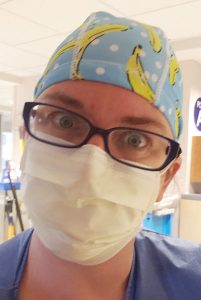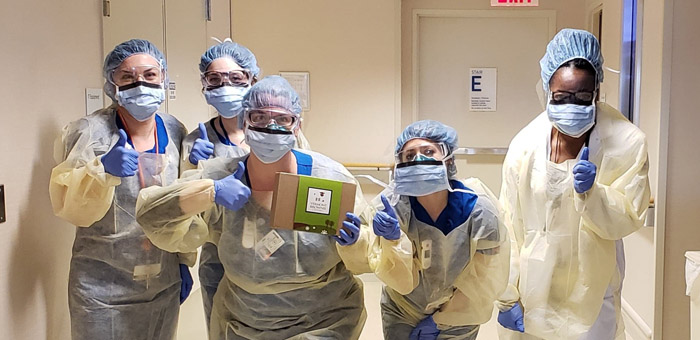By Cathy DeDe, Chronicle Managing Editor
Kelly Casey, Glens Falls High School Class of 1996, is a traveling nurse currently working at Memorial Sloan Kettering Cancer Center in New York City. Contracted to work in the ICU of the cancer treatment hospital this winter, instead she found herself in the center of the coronavirus pandemic in the United States.

“I’m not the front lines,” Ms. Casey says. “I am the last line, your last line of defense against this disease.”
She spoke with The Chronicle by phone early on Monday morning, just off a night shift. She’s also taken on a second gig, she said, “Working at a shelter for housing-insecure New Yorkers who are COVID-19 positive while they quarantine before they go back to their shelters.”
At Sloan Kettering, “Pretty much the only thing we see is COVID patients. I can’t remember the last time in five and a half weeks that I’ve seen anything but COVID.
“I was already here when things started to happen,” Ms. Casey says, with the first cases appearing in December. “I’d already signed my contract well before we had any idea of the size of what this was going to be.”
She said her hospital was spared some of the worst of the pandemic. “People go to Sloan for the high quality cancer care. But they are certainly not immune to COVID.
“Because we are a specialty private hospital we are not as overloaded as some public hospitals. I have friends at other hospitals who usually have two patients on a floor, they’re doubled now.
“We’re in the ICU: If you get to the point you require intubation, 80 percent don’t have successful extubation. They’re on three blood pressure meds, we’re sedating, paralyzing them, ‘proning’ them, flipping onto the belly as a last resort to try and allow the lungs to fully expand to have proper ventilation.”
“We have these patients, not allowed any visitors. They’ve gone through the gamut of treatment options.” She recalls one man, in his 50s or early 60s. “They’ve gotten the call three times that you’re gonna die, but they keep beating the cancer — and then you think: How is this coronavirus going to be the thing to take them out?”
She said, “There’s always variability, but when people get sick with this, they really get sick. I’ve had people come in in the morning, maybe they need a couple liters of oxygen. By the end of the day they’re on intubation.
“They take a turn, and turn hard. The stories you hear of the refrigeration trucks, it’s all true. ER departments see hundreds of new diagnoses still a day.
She said, “It definitely doesn’t feel as intense as it did. Once Mayor de Blasio and Governor Cuomo shut down most things in the City, most people were very cognizant of it, so we are seeing the numbers go down. There are not as many admissions, but it takes 14 to 18 days to recover or run the course, so there’s a two-week lag of what we are seeing in the hospital.”

Ms. Casey said, “The nurses all talk about it every day at work: There is a false sense of security. Now that the big wave is over, we are waiting for the second wave. We’re braced for it. People are getting antsy, they’re tired and frustrated and become lax. But that’s not how it works.”
She said, “Every health care worker I know, we assume we are shedding the virus everywhere. We are uber-cognizant of wearing masks, hand hygiene. If we go out, we do the single thing we need and get back home.”
She said, “At least a half dozen of my coworkers on my floor in the ICU have moved out of their houses into hotels. They are living with multiple generations, elderly parents they don’t want to get sick. I have co-workers out of work two weeks because they’ve gotten COVID, they tested positive, they’re sick and have to go to be hospitalized, they’re out for a month.”
“I try to bring some levity. We have to cover our hair from the start to the end of our shift, to reduce the chance of bringing the virus droplets home in our hair. I saw we were running out of the disposable scrub caps, so I went and ordered a bunch of crazy swim caps online.
“Not being there a long time, I don’t care. I don’t mind being ridiculous. People ask, ‘What cap will she be wearing today?’ I’ll sing Broadway songs. I’ll be the class clown for them.”
Ms. Casey says, “When Ebola happened, everybody was super-prepared. I worked at a teaching hospital and I was on the Ebola task force. Obviously, we never got it.
“The whole H1N1 flu was really bad, but not anything like this. You’d have four or five people really sick with significant respiratory issues that led to multi-organ failures. You didn’t have 20 on your unit that we’ve had going on for weeks.
“Our unit is all taken over by COVID, and we have trained nurses on another floor, working with one ICU nurse over them. I never would have fathomed seeing a makeshift hospital in Central Park and at the Javits Center, but there it is.
“I know there’s been a lot of controversy about New York City patients being life-flighted to hospitals in Albany, Saratoga, Glens Falls,” Ms. Casey says, “worries they are bringing the COVID here. The fact of the matter is there were physically not enough beds in New York for patients that needed that level of care.
“If Glens Falls was in that position and Albany Med said, ‘Nah, we don’t like what they have?’ It’s not reasonable.
“They say ‘Cuomo is giving us a death sentence because he’s taking our ventilators.’ We’ve had physicians and nurses determining who would get on a ventilator, and crossing their fingers that the ones who don’t wouldn’t die in the interim.
“We are sharing resources with the hospitals around us. It’s not us against them. We are all trying to not let it get that far north. I know people who did leave the City to go their home Upstate, and who were super aggressive about quarantining. They don’t want to be the one to have passed it on to someone.”
Ms. Casey urges, “Look. This is a big deal. People get very, very sick and it is very hard to support them through this. As sick as you may be of being home, I promise, we in health care are sick of watching people die every day. Especially watching people have to die alone because their family can’t even be with them.
“When you work in the ICU, you see a lot of death. Cancer is a frustrating death, but this is the most frustrating I’ve ever seen.
“I can’t wait for this to be over so we can leave and see people, friends outside of this hospital, to move on and have our regular distractions from work.”
She says, “So many people from upstate have been really sweet, checking in with me, sending cards, masks.
“What people can do is try to stop the numbers from growing any more. Six feet away is more than you think. Don’t worry about gloves, practice good hand hygiene.
“If you feel that you are doing the right thing, go a little further. I know it’s super hard and frustrating, but stay home. You’re quarantined in a really amazing space. I have a very small apartment in Brooklyn. I wish I could be in my house Upstate’ — home base is in South Glens Falls — “with my backyard and my fire pit.”
A musical theater performer and fan since childhood, Ms. Casey says she was heavily into the Broadway scene when she first got to New York City for this gig.
“I was on a roll. I’d seen 12 or 13 shows, — and then they closed down Broadway. I thought I was going to hit a record for my most shows seen in a year.” She said she was in a crowded audience the night before Mayor Bill de Blasio shut Broadway down, wondering why he hadn’t done so yet.
Copyright © 2020 Lone Oak Publishing Co., Inc. All Rights Reserved.
 Glens Falls Chronicle Serving the Glens Falls/Lake George region; Warren, Washington and northern Saratoga counties since 1980
Glens Falls Chronicle Serving the Glens Falls/Lake George region; Warren, Washington and northern Saratoga counties since 1980

